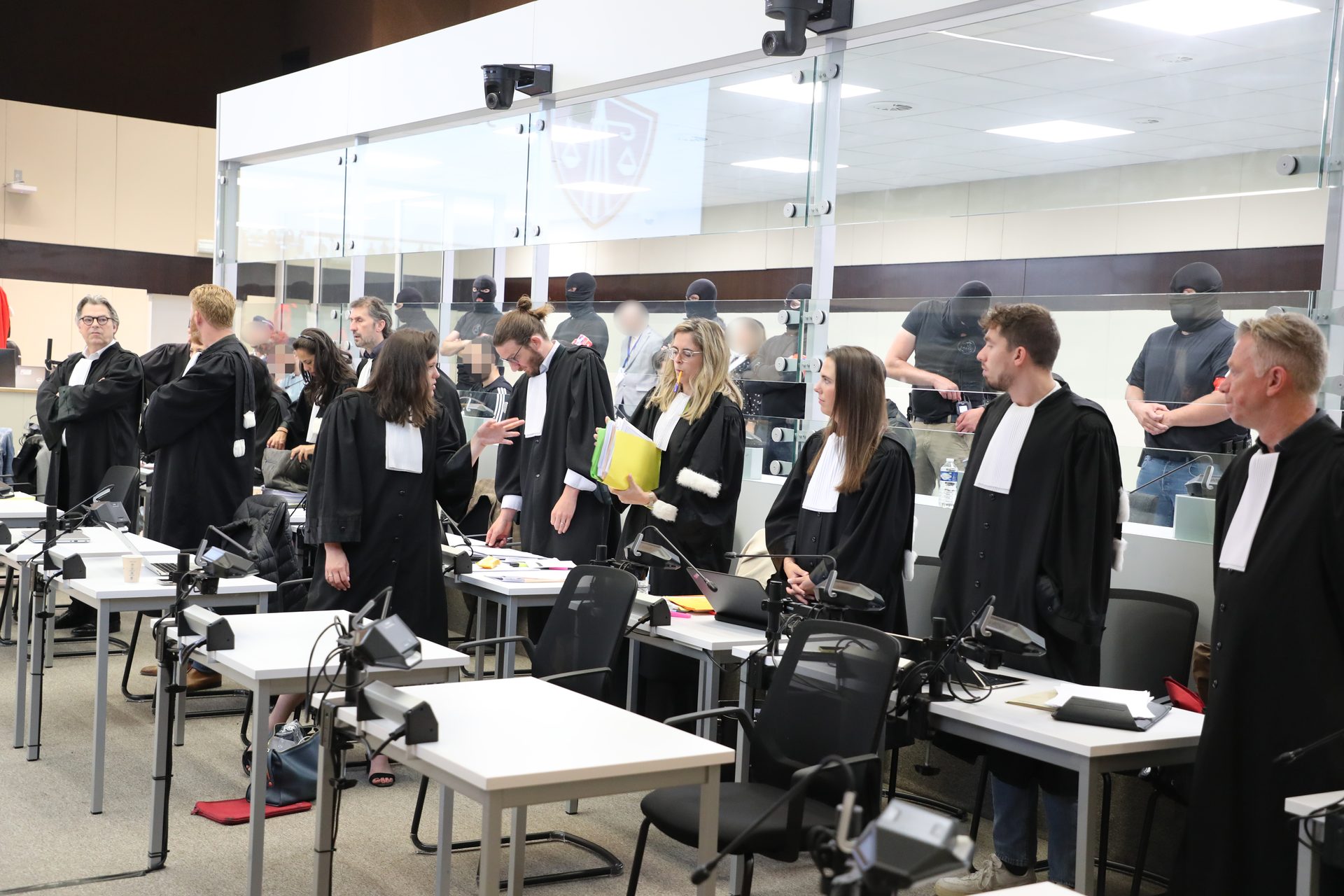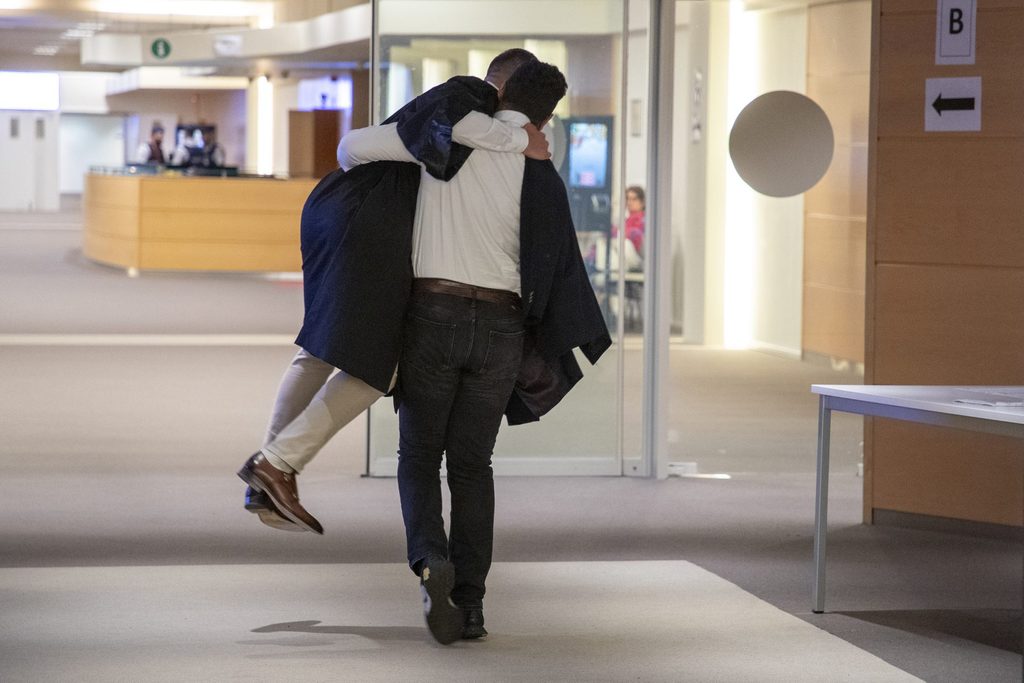Eight of the ten defendants in the Brussels terror attacks trial were found guilty on Tuesday evening of participating in the activities of a terror group on 22 March 2016.
A series of bombings at Brussels Airport in Zaventem and at Maelbeek metro station on 22 March 2016 killed 35 people (including at least three people who succumbed to their injuries and trauma much later) and left more than 300 people severely injured.
The assize jury at the trial for these attacks found six of the eight, Mohamed Abrini, Osama Krayem, Salah Abdeslam, Ali El Haddad Asufi, Bilal El Makhoukhi and Oussama Atar, guilty of terrorist murder. Terrorist murder is punishable by life imprisonment, but the deliberation on sentencing will only take place in September.
The jury noted that it was beyond doubt that the attacks had a terrorist motive, adding that the attacks caused serious damage to Belgium: the explosions in Zaventem and Maelbeek were followed by enormous chaos and the emergency services faced an unprecedented situation, the provincial emergency plan was triggered and the rest of the country came to a near standstill.
"Exceptional measures were taken to protect national and international institutions, and the population," the decision read. "The threat level was placed at 4, the highest possible, and only gradually weakened in the months and years that followed. Even the magazines of Islamic State itself reported the disastrous economic impact of the attacks on our country, including on tourism."
While Sofien Ayari and Hervé Bayingana Muhirwa were found guilty of belonging to a terror group, unlike the others, they were not convicted of murder or attempted murder. The only defendants acquitted on all charges were the Farisi brothers, Smail and Ibrahim.
Leading the pack
After lengthy deliberations, the 12-member jury recognised Oussama Atar as the head of the terrorist organisation behind the attacks. He had been tried in absentia as he is presumed to have died in Syria.
The prosecution maintained that he masterminded the attacks from Syria, where he headed Copex, the external operations wing of the Islamic State (ISIS). He was also reportedly the man behind the 13 November 2015 attacks in Paris.
Atar's nom de guerre, Abou Ahmed, appears on various taped messages addressed to him, as their 'emir', by future kamikazes Najim Laachraoui and Ibrahim El Bakraoui. ISIS announced his death in 2019, but in the absence of concrete evidence, this has not been corroborated.
Meanwhile, Abrini's conviction upheld the indictment of the Federal Prosecutor's Office and the pleadings of the civil party, both of which found that there was no doubt as to his guilt.
The prosecution maintained that the fact that the Belgian-Moroccan had decided not to blow himself up at Zaventem Airport at the same time as suicide bombers Laachraoui and El Bakraoui was not proof that he was not motivated by an intention to kill. However, during the closing arguments, the jury stressed that Abrini had not been involved in making the explosives and bombs used in the attacks.

Lawyers and accused pictured at the start of the final session before the jury deliberation, during the terror attacks trial on 6 July 2023. Credit: Belga / Jonas Roosens
The defence of Krayem, who had been noticed for his silence and regular absences during this trial, did not contest his guilt. "He knows he is so guilty that he is at a loss for words," his lawyer, Jane Peissel, said.
Prosecutor Paule Somers had insisted in particular on the direct involvement of the Swede, now aged 30, in preparing the attacks by purchasing material intended for making the bombs and manufacturing the explosive charges.
Another defendant, El Makhoukhi, not only provided essential assistance to the jihadist cell, but was also supposed to take over after the suicide attacks and the deaths of the main members of the group. The main element attributed to the 34-year-old Belgian-Moroccan is the recovery of the cell's weapons from the safe house on Rue Max Roos in Schaerbeek. El Makhoukhi has always refused to reveal to whom he entrusted them.
Abdeslam found guilty of murder
For his part, Abdeslam was found guilty of murder and attempted murder even though, as the defence pleaded, the Frenchman had been in prison on the day of the attacks. The jury noted that close links could be established between the building on Rue du Dries, where Abdeslam, Ayari and Belkaïd had been in hiding, and the safe house on Rue Max Roos, where Abrini, El Bakraoui and Laachraoui had stayed.
The jury also noted that in both places, handcrafted flags of ISIS and weapons of war had been stocked. Other incriminating evidence included telephone calls between the two addresses and flash drives connected to computers found in both locations, including one with files on potential assassination targets.
This led the jury to dismiss the argument by his defence that the apartment on Rue du Dries was merely a hideout and that Rue Max Roos was the only location where members of the terror group had conspired.
The jury stressed that Abdeslam had decided to stay in Europe to "finish the work" begun by the Paris attacks, recalling that, in a letter to Atar, he had referred to a belt of explosives that he had worn in Paris and asked to be "better equipped in future."
Related News
- Belgium in Brief: Can our judicial system deliver justice?
- How the bombs changed Brussels, and how the city is still coming to terms with them
- How Belgium moved on from the bombings
The jury concluded on Tuesday that Muhirwa, who had housed the two suicide bombers in his flat before and after the attacks, did not take part in the March 2016 attacks, but the 38-year-old Belgian-Rwandan was found guilty of participating in the activities of a terrorist group, considering him a de facto member of the cell behind the attacks.
Like Muhirwa, Ayari was acquitted of murder and attempted murder. However, the 29-year-old Tunisian was found guilty of participation in the activities of a terrorist group. Ayari's two lawyers had argued that the man, who had been in prison at the time, had had no knowledge of the preparation of the attacks.
Grey areas
The other suspect convicted on Tuesday was 38-year-old Belgian-Moroccan Ali El Haddad Asufi. The jury agreed with the prosecution that he had acted as a driver for his friend, suicide bomber El Bakraoui, whom he knew to be radicalised.
The prosecution also charged that he went to the flat on Rue Max Roos, on the eve of the attacks, to retrieve the USB stick containing audio documents – including wills – recorded by El Bakraoui. He would therefore also have seen the explosives being prepared in the safe house.
The defence pointed to the many "grey areas" concerning its client which should have weighed in his favour in the name of reasonable doubt. It also argued that Asufi showed no signs of radicalisation and that he had been kept away from making the bombs.
In his final address to the jury on 6 July, Ali El Haddad Asufi reiterated that he did not agree with the "atrocities" of the attacks. "I have been proclaiming my innocence for seven years," he said while considering that he had "paid enough (for his) association with El Bakraoui."

